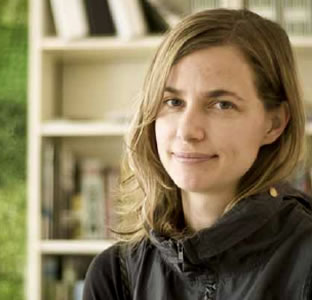UTSA presents Oct. 17 lecture by Columbia University landscape architect

Kate Orff

Kate Orff
By Nicole Chavez
Development Assistant, College of Architecture
(Oct. 17, 2012) -- The UTSA College of Architecture Fall Lecture Series will present "Petrochemical America" at 5:30 p.m., Wednesday, Oct. 17 in the Buena Vista Street Building Assembly Room (1.338) on the UTSA Downtown Campus. The lecture is based on a book of the same name and will be presented by author Kate Orff, assistant professor at Columbia University, and the founding principal of SCAPE, a landscape architecture and urban design studio based in Manhattan.
This semester, the College of Architecture lecture series focuses on research as it relates to the built environment, looking at the impact of both natural and man-made components on our surroundings. The series is free and open to the public.
"Petrochemical America"is a richly illustrated collaboration between Orff and photographer Richard Misrach that explores how oil and petrochemicals have transformed the physical form and social dynamics of the American landscape. The book focuses on the industrialized landscape of the Mississippi River Corridor that stretches from Baton Rouge to New Orleans, an area of intense chemical production that was dubbed "Cancer Alley" when unusually high reports of cancer and other diseases were discovered in the region.
Misrach's haunting photographs are combined with Orff's "Ecological Atlas," a series of visual narratives or "throughlines" that were developed through intensive research and mapping of data from the region. The result is a revealing study of the ways in which the petrochemical industry, now firmly entrenched in American culture, has permanently shaped our landscape.
"Today, we are starting to understand the consequences, at a local, regional, and global scale, of the age of the present regime of oil and petrochemicals," said Orff in her essay, "Petrochemical America: Toward a New Energy Landscape," published by the Huffington Post. "What remains to be collectively imagined is what a shift away from fossil fuels and towards renewable energy forms would mean in the future in terms of generating a new American landscape aesthetic of promise and productivity," she said.
Orff is part of Columbia's Graduate School of Architecture, Planning and Preservation, where she leads studios and seminars that integrate the earth sciences into the design curriculum. She also is a director of Columbia's Urban Landscape Lab, an inter-disciplinary applied research group dedicated to affecting positive social and ecological change in the joint built-natural environment. Orff belongs to a generation of landscape architects that value research highly, viewing it as an intrinsic component of all architectural design processes. Themes of sustainable development, biodiversity and community-based change permeate her work, and she is often recognized for her innovative and practical solutions.
In 2010, Orff participated in "Rising Currents: Projects for New York's Waterfront, an installation displayed by the Museum of Modern Art (MoMA) in New York. MoMA and P.S.1 Contemporary Art Center put together the architects-in-residence program to address one of the most urgent challenges facing the nation's largest city: sea-level rising resulting from global climate change. Five teams were asked to re-envision the coastlines around New York Harbor and to imagine new ways to occupy the harbor itself with adaptive "soft" infrastructures that are sympathetic to the needs of a sound ecology.
Orff led a team from SCAPE in creating "Oyster-Tecture," a simple, yet visionary idea to seed oysters in the notoriously dirty Gowanus Canal. Because a single oyster is capable of filtering up to 50 gallons of water a day, Orff's idea was to construct a "living reef" out of fuzzy rope that would support oyster and mussel growth, potentially cleaning millions of gallons of harbor water. A small pilot project utilizing Orff's idea is currently in the works.
Among other speaking engagements promoting the launch of "Petrochemical America," Orff and Misrach presented a joint lecture and book signing at the Museum of Modern Art last month. Orff also is co-editor of "Gateway: Visions for an Urban National Park," and her essays have appeared in The Great Leap Forward, Rising Currents, Waterfront Visions, Volume and other publications. She has won local and national design awards and was named an ELLE magazine "Planet Fixer," a Dwell magazine Design Leader, and one of H&G's 50 For the Future of Design. Her work has received two National ASLA awards and has appeared in the Museum of Modern Art, the HK/Shenzhen Biennale and other international exhibits.
-------------------------------
For more information email Nicole Chavez.
-------------------------------
UTSA College of Architecture Fall Lecture Series
Nov. 7 -- Eran Ben-Joseph speaking on "ReThinking a Lot: The Design and Culture of Parking," is co-sponsored by the UTSA Texas Sustainable Energy Research Institute.
Events
This event will acknowledge graduating seniors from the McNair Scholars program at UTSA before inducting the new cohort of scholars into the program.
North Paseo Building (NPB 5.140), Main CampusAt this memorable celebration, UTSA graduates will be introduced one-by-one to cross the stage and accept their doctoral degrees.
Arts Building Recital Hall, Main CampusRoadrunner Walk is an event for graduating students to have a memorable walk on campus to celebrate an important milestone and their achievements. Graduates will walk along the Paseo while being celebrated by the UTSA community, friends, and family members.
Student Union Paseo, Main CampusCelebrate the accomplishments of College of Education and Human Development, College for Health, Community and Policy, College of Sciences and University College.
Alamodome, 100 Montana St.Celebrate the accomplishments of Alvarez College of Business, College of Liberal and Fine Arts and Klesse College of Engineering and Integrated Design.
Alamodome, 100 Montana St.

